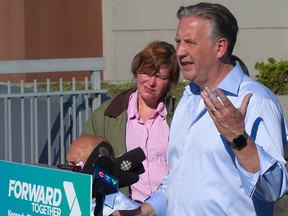Vancouver mayor proposes team of 25 counsellors to address street disorder if re-elected
Kennedy Stewart said 25 new workers would be trained to address non-criminal incidents involving the homeless, addicted or mentally ill.

Article content
Vancouver Mayor Kennedy Stewart says, if re-elected, he would offer residents and businesses looking for help dealing with individuals suffering from mental-health, addictions crises or homelessness the chance to call a mobile team of trained counsellors instead of police.
Stewart, who is running for his second term in next month’s elections, said under the proposal, residents would be able to call the city’s 311 help hotline to dispatch members of a team of 25 new counsellors instead of law enforcement.
An advocate for the Downtown Eastside said she supports the new service to help de-escalate incidents involving those suffering from a mental-health crisis, but another candidate says the proposed Health and Addictions Response Team isn’t the answer to the violence and unprovoked attacks happening regularly in the city.
Stewart said residents or businesses don’t always know whom to call when they see someone in distress on the street or on their property, and often end up calling police. That can sometimes escalate the situation, he said.
Sarah Blyth of the Overdose Prevention Society, who attended the news conference with Kennedy, said sometimes if someone is in a drug-induced psychosis they may need help from a peer or someone who understands they may just need some sleep or a meal.
“If you take a compassionate approach, you can actually de-escalate a lot of the situations,” she said.
But the problem Vancouver is facing with an increasing number of violent, random stranger attacks is “not going to be solved by a new phone number,” said Bill Tieleman, who is running for city council under the TEAM banner.
TEAM’s view is that there is already a shortage of first-responders and health-care workers.
“Where are the workers going to come from?” he asked. “You could spend years looking for them.”
Tieleman also said millions are already being spent on services for the opioid crisis and “we’re not making progress.”

TEAM said it would appoint a commissioner to do an audit of the services available and money being spent now to see where delivery overlaps could be improved to make it more effective.
Kennedy said the HART program is based on the CAHOOTS — Crisis Assistance Helping Out on the Streets — mobile crisis intervention program that has been operating in Eugene, Ore., for the past 30 years.
But the mayor had no specific outcome goals for HART or for reducing the number of overdose deaths in Vancouver.
The Canadian Mental Health Association has been running a similar “civilian-led” crisis care pilot project on the North Shore since last November, and is about to expand it to New Westminster and Victoria, said B.C. branch CEO Jonny Morris. He said the program requires trained peers to attend calls with a trained nurse or social worker or other health professional.
“The unique element of having peers attend the calls helps build trust and de-escalates the situation,” he said.
Morris said the CMHA program shares some “common principles” with the Vancouver proposal but the CMHA doesn’t endorse any model or position by any political party.
Stewart said he would initially allocate $5 million in the 2023 budget for the program using the existing overdose crisis contingency reserve fund established in 2017.
More news, fewer ads: Our in-depth journalism is possible thanks to the support of our subscribers. For just $3.50 per week, you can get unlimited, ad-lite access to The Vancouver Sun, The Province, National Post and 13 other Canadian news sites. Support us by subscribing today: The Vancouver Sun | The Province.








Postmedia is committed to maintaining a lively but civil forum for discussion. Please keep comments relevant and respectful. Comments may take up to an hour to appear on the site. You will receive an email if there is a reply to your comment, an update to a thread you follow or if a user you follow comments. Visit our Community Guidelines for more information.